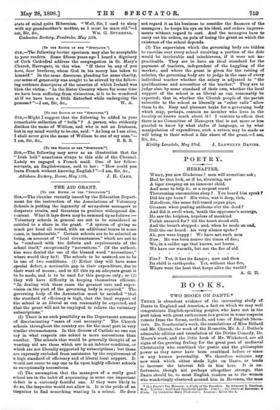THE AID GRANT.
[To THE EDITOR 01 THE " SPECTATOR."]
Stn,—The circular recently issued by the Education Depart- ment for the instruction of the Associations of Voluntary Schools is putting the ingenuity of scrupulous managers to desperate straits, and threatens to produce widespread dis- content. What it lays down may be summed up as follows :— Voluntary schools in general are not to be considered as entitled to a share in the grant. "A system of giving so much per head all round, with an additional bonus in some cases, is inadmissible." Certain schools are to be selected as being, on account of "local circumstances," which are not to he "confused with the defects and requirements of the school itself," exceptionally "necessitous." (If the authori- ties were denied the use of the blessed word "necessitous," where would they be?) The schools to be assisted are to be in one of two conditions. (1) Either they will have some special defect, a noticeable gap in their expenditure, due to their want of means ; and to fill this up an adequate grant is to be made, and is to be used for this purpose only; or (2) they will have difficulty in keeping themselves efficient. ." In dealing with these cases the greatest care and super- vision on the part of the governing body is required." The governing body of the Association must be satisfied "that the standard of efficiency is high, that the local support of the school is as liberal as can reasonably be expected, and that the grant will not be employed to relieve the voluntary subscriptions."
(1) There is no such possibility as the Department assumes of discriminating "cases of real necessity." The Church schools throughout the country are for the most part in very similar circumstances. In this diocese of Carlisle no one can say in what respects one school is more necessitous than another. The schools that would be generally thought of as wanting aid are those which are in an inferior condition, or which are not liberally supported by subscriptions; but these are expressly excluded from assistance by the requirement of a high standard of efficiency and of liberal local support. It would not occur to any one to fix upon highly efficient schools as exceptionally necessitous.
(2) The assumption that the managers of a really good school are in the habit of acquiescing in some one important defect is a curiously fanciful one. If they were likely to do so, the inspector would not allow it. It is the pride of an inspector to find something wanting in a school. He does
not regard it as his business to consider the finances of the managers; be keeps his eye on his ideal, and orders improve- ments without regard to cost And the managers have to carry out his orders, on pain of losing the grant on which the existence of the school depends.
(3) The supervision which the governing body are bidden to exercise over every school receiving a portion of the dole would be intolerable and mischievous, if it were not im- practicable. They are to have an ideal standard for the payment of teachers, independent of the haggling of the market; and where the grant is given for the raising of salaries, the governing body are to judge in the case of every individual teacher whether the salary is adjusted to "the qualifications and necessities of the teacher." They are to judge also, by some standard of their own, whether the local support of the school is as liberal as can reasonably be expected; that is, whether the Church people of the parish subscribe to the school as liberally as "other calls" allow them to do. Easy and pleasant tasks for a governing body which may, perhaps, contain no member who lives in the locality or knows much about it ! I venture to affirm that there is no Committee of Managers that is not more or less puzzled to know by what shifts of language, or by what manipulation of expenditure, such a return may be made as will bring to their school a fair share of the grant.—I am, Sir, Sto.,


































 Previous page
Previous page